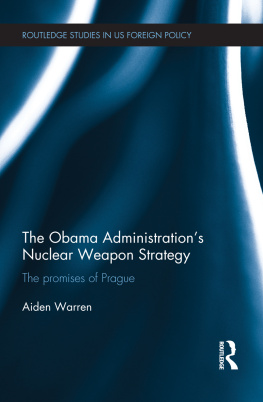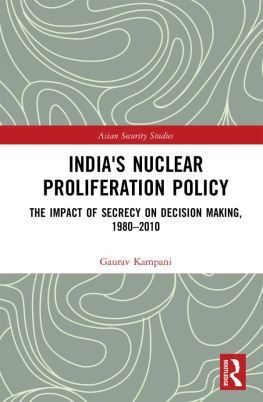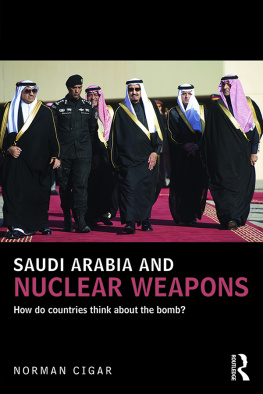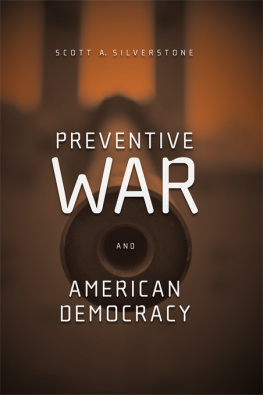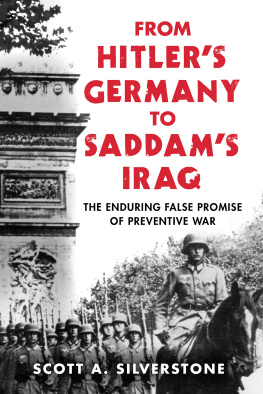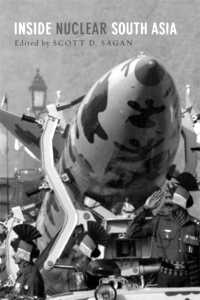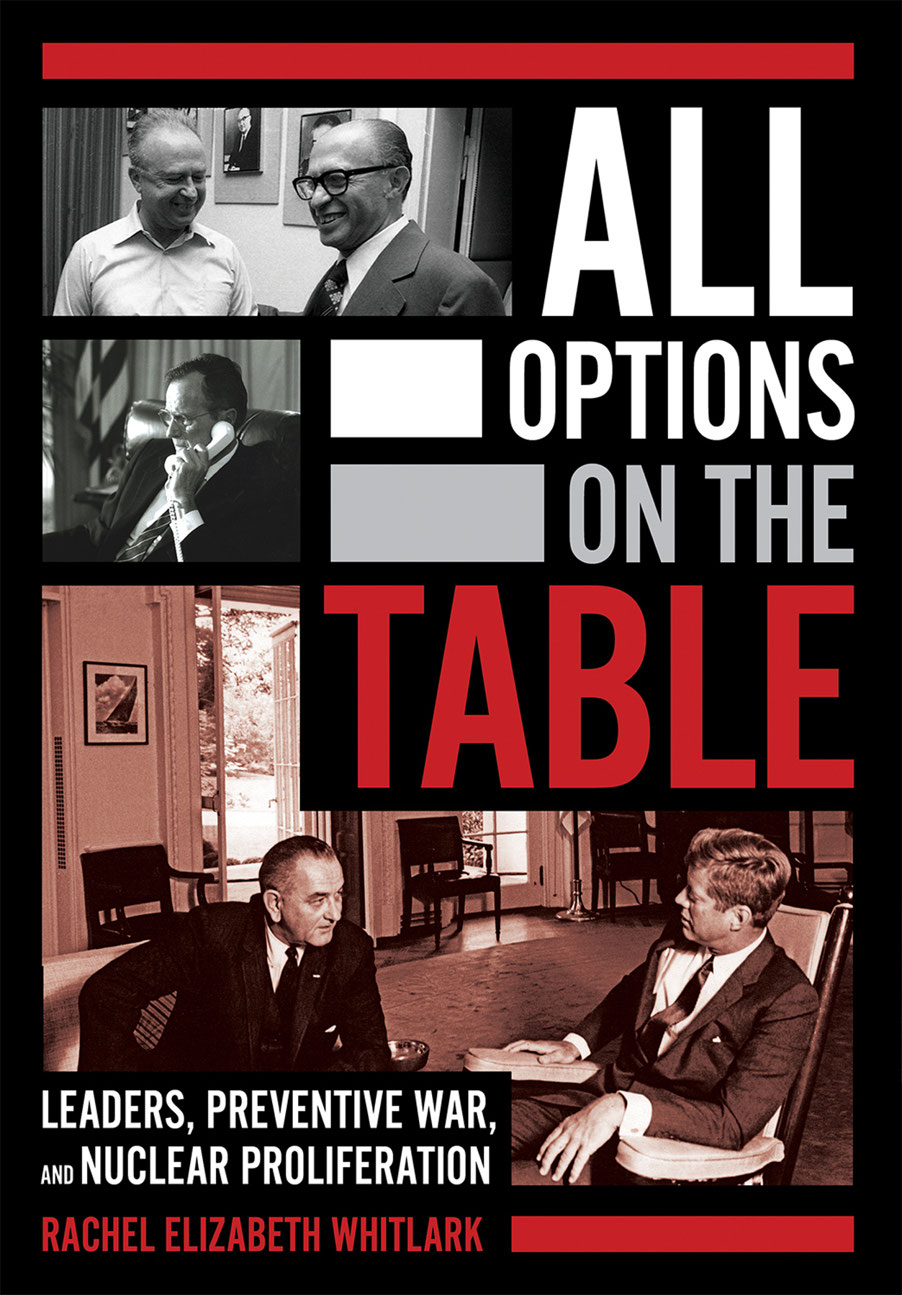All Options on the Table
Leaders, Preventive War, and Nuclear Proliferation
RACHEL ELIZABETH WHITLARK
Cornell University Press
Ithaca and London
To my grandmother Norma Proshan, the most inspiring and inimitable person I knew
Acknowledgments
It is surreal to finish a book during a global pandemic. On the one hand, there is so much uncertainty and anxiety that it is difficult to concentrate. On the other hand, working on a book is an excellent distraction from events swirling around outside. Quarantine in particular is an odd, if useful, forcing mechanism.
Long before the final push to complete the manuscript, this book benefited from the support, feedback, and advice of many communities and individuals. At the George Washington University (GW), Charlie Glaser, Jim Goldgeier, and Elizabeth Saunders believed in my work perhaps before I did. Their patience and guidance then and now has been invaluable.
I was tremendously lucky to receive the support of a Stanton Nuclear Security Fellowship that brought me to Cambridge, Massachusetts, and the Security Studies Program (SSP) at the Massachusetts Institute of Technology. Owen Cot and Barry Posen were generous with their time and their literature recommendations. My development as an academic soared through participation in two groups within SSP: the Strategic Forces Working Group and the International Relations Work-in-Progress Group. At the time, no similar organization existed at GW, and it was with these two groups that I learned how to thinkabout both my own work and that of others. I am grateful to the members of both groups.
My stay in Cambridge continued through the generosity of the International Security Programs Project on Managing the Atom (MTA) at Harvard Universitys Kennedy School of Government and Belfer Center for Science and International Affairs. What began with a one-year fellowship morphed into two additional years of work. There I found, in Paul Avey, Gene Gerzhoy, Evan Perkoski, Mike Poznansky, Miranda Priebe, Jaganath Sankaran, and Oren Setter, friendship, research advice and support, and collegiality I will keep with me long into the future. My years in Boston also connected me to Jennifer Erickson and Catherine Zweig Worsnop. Their substantive feedback, professional advice, recipe suggestions, and novel recommendations have been unparalleled. I remain forever grateful to the late Marty Malin, as well as Matt Bunn, Steve Miller, and Steve Walt, for letting me stick around the Belfer Center as long as I did. I am writing these acknowledgments a few months after Martys passing, and it remains nearly impossible to imagine returning to MTA without him there. But for Marty and his cocollaborators, I would have left academia long ago. Instead, because of the opportunity to spend consecutive years at MTA, I was able to find the perfect-for-me academic job, and I will always be grateful.
That perfect-for-me academic job turned out to be in the Sam Nunn School of International Affairs at the Georgia Institute of Technology. Though I never expected to live in the South, I have been gifted with tremendous colleagues and countless opportunities. Though no one could recall previously holding a book workshop in the department, my colleagues and department chair took to the idea and generously supported the effort without hesitation. Jenna Jordan and Adam Stulberg kindly shepherded the workshop and made sure that the conversation stayed on track. Jenna has read the complete book more times than is reasonable. I am tremendously grateful for her friendship, as well as her time and dedication in helping to make the book better. I am also indebted to book workshop participantsMlfrid Braut-Heghammer, Matthew Fuhrmann, Scott Sagan, and Todd Sechserfor taking the time out of their busy lives to treat the manuscript with such care. It goes without saying that the substantive feedback and presentational advice of this group of scholars was outstanding. The support, encouragement, and kindness they showed throughout the process were what surprised me. These four scholars model not only the best of the political science discipline but also the generosity and support of exceptional mentorship.
Also at Georgia Tech, Miki Fabry and Larry Rubin offered comments on the manuscript and useful advice for making it stronger and more concise. Getting over the final hurdle would not have happened without the stellar research assistance of Andrew Arrington, Abby Burke, and Jack Crawford. I know they will go on to illustrious careers and will make our world a better place.
To my mind, mentors can be found in many different places. Through Jim Goldgeier and the Bridging the Gap project, I met Naazneen Barma, Brent Durbin, Bruce Jentleson, Jordan Tama, and Steve Weber. Their vision, advice, kindness, and humor have made this journey intellectually richer and much more enjoyable than I would have thought possible. Through Bridging the Gap and by virtue of living in Washington, DC, I found great friends in Jeff Colgan and Michael Weintraub. They are always ready to lend an ear, offer professional advice, find an escape route at a conference, and laugh at whatever shenanigans come our way. This bookalong with the rest of my scholarship and, frankly, my sanityowes a tremendous debt of gratitude to the writing groups that have been a consistent feature of my life. At GW, the YentasShannon Powers and Amir Stepakkept me laughing and kept me writing. More recently, the RED writing group has become my lifeline. Elizabeth Acorn, Danielle Gilbert, and I have met nearly weekly for the last few years. I hope someone is keeping track of the many publications and professional successes that emerged during this time. Reading each word of this book repeatedly, they have pushed me to clarify and improve at every stage. They have also offered invaluable professional advice along the way. Dani painstakingly edited the final manuscript. Each sentence is tighter and the manuscript that much stronger for her skill and dedication. Honorary RED member Jonathan Pike offered suggestions at critical junctures.
I have also benefited from the kindness of many people throughout this journey. At MIT, Jolie Divon Saraf, Lynn Levine, Harlene Miller, and Laurie Scheffler welcomed me to Boston, and their warmth continues to this day. At Harvard, Susan Lynch made the trains run on time and made sure that we fellows did what we were meant to do. At Georgia Tech, Marilu Suarez literally has the keys to the castle. Since our initial e-mails to schedule my interview all those years ago, Marilu has been the kind of person who treats you like family the moment you arrive and makes sure you have the right school supplies at the start of each new term.
I am also immensely grateful to the librarians whose work and dedication made this book possible. The archivists at the John F. Kennedy, Lyndon B. Johnson, George H. W. Bush, and William J. Clinton Presidential Libraries facilitated and advanced the research for this book in ways that I had not imagined. Even during a pandemic these archivists were able to hunt down pieces of information to confirm references and make the contents more precise. I am also indebted to the staff of the National Security Archive and the State Departments Office of the Historian and the work they do in making document collections available for scholars use and publicly accessible on their websites. The resources they provide in a virtual environment are invaluable to students everywhere, myself included. I am especially grateful to the Austin Public Library for assistance tracking down a particularly obscure reference to substantiate a claim I make in chapter 3. Finally, Jay Forrest and the team of librarians at the Georgia Tech Library were generous with their time and hunted down too many requests to count.
Next page


